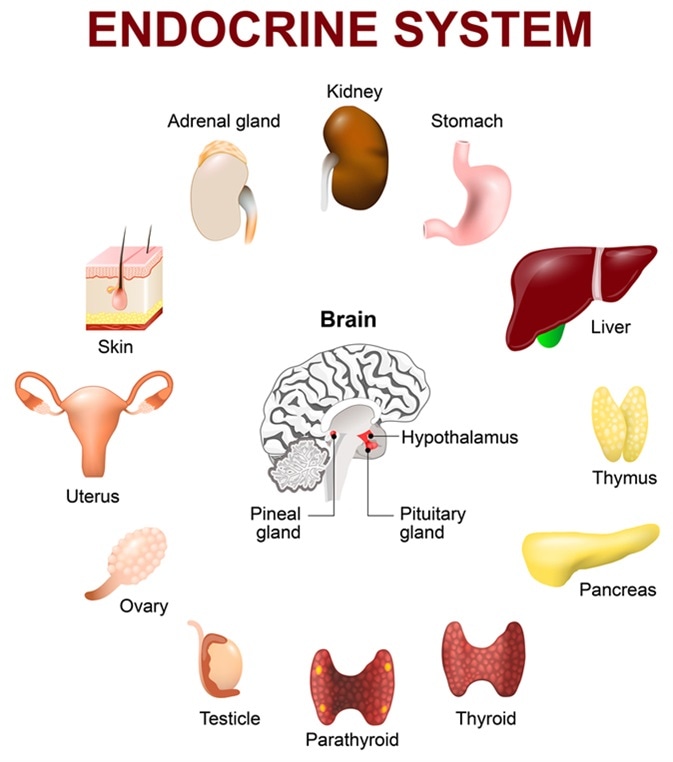An endocrinologist is a doctor who specializes in the diagnosis and treatment of a wide range of disorders involving the endocrine system. Such disorders are typically characterized by problems with metabolism, growth and development. If these issues are presented in an infant, child or teenager, they will require the attention of a pediatric endocrinologist.
The Endocrine System
The endocrine system controls hormone secretion throughout the body, and therefore influences the functioning of almost every cell and organ. This means that it plays a pivotal role in the regulation of mood, metabolism, growth and development, as well as tissue function and reproductive processes.
Within the endocrine system are glands, which are groups of cells that produce and release specific hormones to particular regions of the body. They do this by secreting hormones, which may then enter the bloodstream where they can be transported to other cells to relay specific chemical messages.
The major glands of the human endocrine system include the hypothalamus, a cluster of cells located at the base of the brain, the pituitary, which is located just beneath the hypothalamus, the thyroid, found at the front of the neck, as well as reproductive glands, such as the testes or ovaries, and the pancreas, a glandular organ that is also part of the digestive system.

Human anatomy. Endocrine system (pituitary gland, pineal gland, testicle, ovary, pancreas, thyroid, thymus, adrenal gland). Image Credit: Designua / Shutterstock
What Disorders Do Pediatric Endocrinologists Treat?
Abnormal functioning of the endocrine glands can produce either too much or too little of a hormone, which can be harmful to the body. As the endocrine system involves many different systems and structures, these disorders are usually highly complex and extremely varied.
Pediatric Endocrinology Addressing a Growing Problem
Endocrine problems typically seen in children or adolescents include:
- Type 1 diabetes: occurs when the insulin-producing cells in the pancreas are damaged, causing blood glucose levels to become very high.
- Type 2 diabetes: occurs when pancreatic cells become immune to insulin, causing glucose to build up in the bloodstream.
- Growth disorders: if the pituitary gland produces too much or too little of growth hormone, this can cause a child to develop height, weight and sexual maturity at abnormal speeds.
- Thyroid disorders: hyperthyroidism (when the thyroid is too active) and hypothyroidism (when the thyroid is under-active) can alter growth, development and behavior.
- Adrenal disorders: one common adrenal disorder is Cushing’s syndrome, caused by high levels of adrenocorticotropic hormone and resultant excess cortisol due to over-activation of the adrenal glands.
- Puberty disorders: abnormal hormone secretion from the pituitary to the reproductive glands can stimulate puberty to occur either very early in development (precocious puberty) or cause puberty to be delayed.
- Disorders of sex development: sometimes the reproductive organs and genitals do not develop as expected due to genetic/hormonal abnormalities, resulting in a mixture of male and female sexual characteristics.
The Role of a Pediatric Endocrinologist
Diagnostic tests performed by a pediatric endocrinologist will typically involve blood and urine tests in order to determine whether there are irregular hormone levels in the body. Functional imaging tests may also be needed to help locate reasons for abnormal gland functioning, e.g. a tumor.
Due to the wide variety of disorders involving the endocrine system, there is no one treatment option. However, most disorders usually require hormone regulation using drug therapy in addition to nutritional guidance. For example, type 1 diabetes requires daily sessions of insulin therapy, meanwhile many cases of type 2 diabetes can be managed with simple lifestyle changes and careful monitoring of blood glucose levels before pharmacotherapy becomes necessary.
In addition, children experiencing problems that affect their growth or sexual development can be emotionally, as well as physically affected, and so pediatric endocrinologists are trained to be sensitive to such issues.
References
Further Reading
Last Updated: Feb 26, 2019